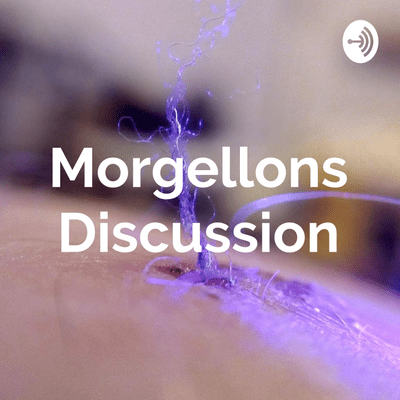
Morgellons Discussion
Podcast door Jeremy Murphree
Tijdelijke aanbieding
2 maanden voor € 1
Daarna € 9,99 / maandElk moment opzegbaar.

Meer dan 1 miljoen luisteraars
Je zult van Podimo houden en je bent niet de enige
4.7 sterren in de App Store
Over Morgellons Discussion
Jeremy Murphree discusses the latest research of Morgellons disease.
Alle afleveringen
54 afleveringenBrian Kirk’s video (https://www.youtube.com/watch?v=_SWGH_qr1rE&list=PL3nII97JiwYt359ydCh_z7c2qxk2_3u6l&index=16) about his college project to raise #Morgellons awareness is awesome—he’s giving a voice to folks dealing with something super tough. Morgellons brings weird fibers in skin sores, crawling or stinging feelings, plus exhaustion and achy joints, and it’s often dismissed as “all in your head.” Brian’s work shines a light on these struggles, showing how real they are for patients who feel ignored. But he missed mentioning #LymeDisease, and that’s a big deal because research ties it closely to Morgellons, offering clues to what’s really going on.Studies are flipping the old story that Morgellons is just psychological. A 2015 study found #Borrelia burgdorferi, the Lyme bacteria from tick bites, in 24 out of 25 Morgellons patients, using tests like PCR to spot it in skin or blood. Those fibers? Not clothes—they’re keratin and collagen, made by your body, likely reacting to the infection. Another study in 2018 saw 6% of 1000 Lyme patients with Morgellons symptoms, all testing positive for Borrelia, often with extra bugs like Babesia. This link suggests Morgellons isn’t random—it’s tied to Lyme for many, giving patients a starting point to seek help.Why This Changes EverythingKnowing Morgellons and Lyme are connected is a game-changer for people stuck in limbo. Patients often get told their sores and crawling sensations are imaginary, which is crushing when you’re living it. Finding Borrelia in most Morgellons cases proves there’s a real infection, not a delusion, giving folks hope and a reason to push for doctors who’ll dig deeper. It’s like finally having proof you’re not making it up, which can be a huge relief after being dismissed.This connection also points to better testing and treatment. Lyme’s hard to catch with standard blood tests, especially in chronic cases, but sensitive ones like PCR can find Borrelia in Morgellons patients, as that 2015 study showed. Antibiotics like doxycycline have helped some, like a woman in a 2021 case whose lesions cleared up fast. Plus, many Morgellons folks have other infections like Bartonella, so checking for those helps too. Brian’s project gets people talking, and adding the Lyme angle means more patients might get the right tests and meds, not just shrugs.Morgellons or Not?Figuring out if someone’s got Morgellons takes careful work, but doctors can do it by listening and checking the right things. Start with the patient’s story: Are there fibers in sores? Crawling sensations? Tiredness or aches? Ask about tick bites or time in Lyme-heavy areas, though lots of folks don’t recall a bite. Then check the skin—Morgellons fibers show up under a magnifying glass, stuck in lesions, made of body stuff like keratin, not random threads. A dermatologist can biopsy if needed to be sure.Next, test for Lyme with sensitive tools like PCR, since regular tests often miss chronic cases—that 2015 study nailed Borrelia in nearly every patient this way. Check for other tick bugs like Babesia too. If fibers aren’t there or tests are negative, consider scabies, allergies, or, only after ruling out infections, something psychological like delusional parasitosis. Don’t rush to that, though—Lyme can cause anxiety, and chronic symptoms stress anyone out. Brian’s video pushes for understanding, and getting the diagnosis right, with help from non-profits like the Charles E. Holman Morgellons Disease Foundation, means patients get answers, whether it’s Morgellons or something else.Middelveen MJ, et al. Exploring the association between Morgellons disease and Lyme disease: identification of Borrelia burgdorferi in Morgellons disease patients. BMC Dermatology. 2015;15:1.https://bmcdermatol.biomedcentral.com/articles/10.1186/s12895-015-0023-0
Hygromycin A, an antibiotic previously studied for swine dysentery, shows promise in treating Lyme disease and syphilis. Research indicates its high effectiveness against Treponema pallidum, the syphilis bacterium. An American company, FlightPath, is seeking approval for human trials. The antibiotic's advantage lies in its minimal impact on the body's natural microbiome. The article, from a website focused on Lyme disease and Morgellons, highlights this potential breakthrough. New Antibiotic Could Rid Earth Of Lyme Disease and Chronic Syphilis [https://www.morgellonssurvey.org/new-antibiotic-could-rid-earth-of-lyme-disease-and-chronic-syphilis-for-good/]
Research by Dr. Alan MacDonald suggests that Lyme disease bacteria, Borrelia burgdorferi, reside within parasitic nematodes in the brains of patients with neurological conditions like MS, glioblastoma, and Lewy body dementia. His findings, presented on Capitol Hill, indicate that standard Lyme tests are inadequate, leading to misdiagnosis and potentially fatal consequences. This research builds upon prior studies showing nematodes in ticks, highlighting a potential link between tick-borne infections and chronic brain diseases. MacDonald utilized FISH technology to confirm the presence of Borrelia DNA within the nematodes. The study emphasizes the need for improved diagnostic tools and treatment strategies for Lyme disease. Lyme Bacteria Hides Inside Parasitic Worms, Causing Chronic Brain Diseases - Morgellons Survey [https://www.morgellonssurvey.org/lyme-bacteria-hides-inside-parasitic-worms-causing-chronic-brain-diseases/]
This Deep Dive reviews an article from a website about Morgellons that focuses on the stigma surrounding both Morgellons and Lyme disease. The article argues that societal misconceptions and biases, coupled with the complex nature of these conditions, have created significant barriers to accurate diagnosis and treatment. The article advocates for greater understanding, awareness, and compassion towards those suffering from Morgellons and Lyme disease, emphasizing the need to challenge misconceptions and debunk false information. Morgellons Stigma [https://www.morgellonssurvey.org/morgellons-stigma/]
This episode looks at a website article which critiques a new Mayo Clinic case study on Morgellons disease, arguing that the study fails to properly understand the condition and its potential connection to Lyme disease. The article emphasizes the importance of considering Lyme disease and other infections as underlying causes of Morgellons, highlighting the limitations of current diagnostic methods. It also criticizes the Mayo Clinic study for misdiagnosing the patient as delusional despite observing fibers on their skin, a potential symptom of Morgellons. The author emphasizes the need for more thorough investigations and a deeper understanding of the potential infectious nature of Morgellons.

4.7 sterren in de App Store
Tijdelijke aanbieding
2 maanden voor € 1
Daarna € 9,99 / maandElk moment opzegbaar.
Exclusieve podcasts
Advertentievrij
Gratis podcasts
Luisterboeken
20 uur / maand

































